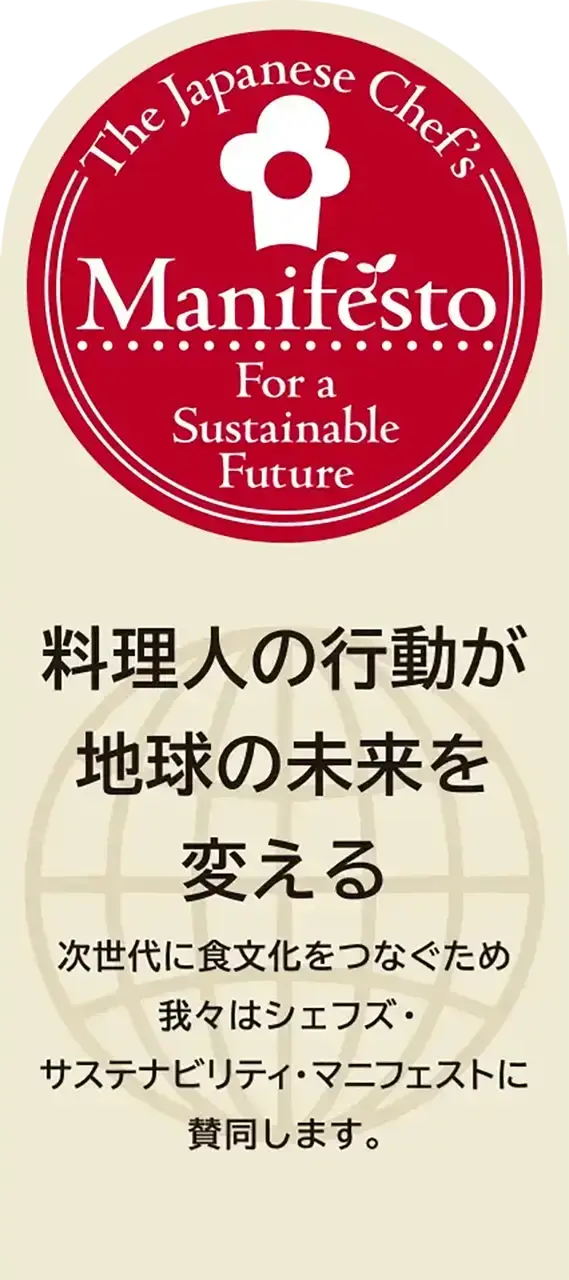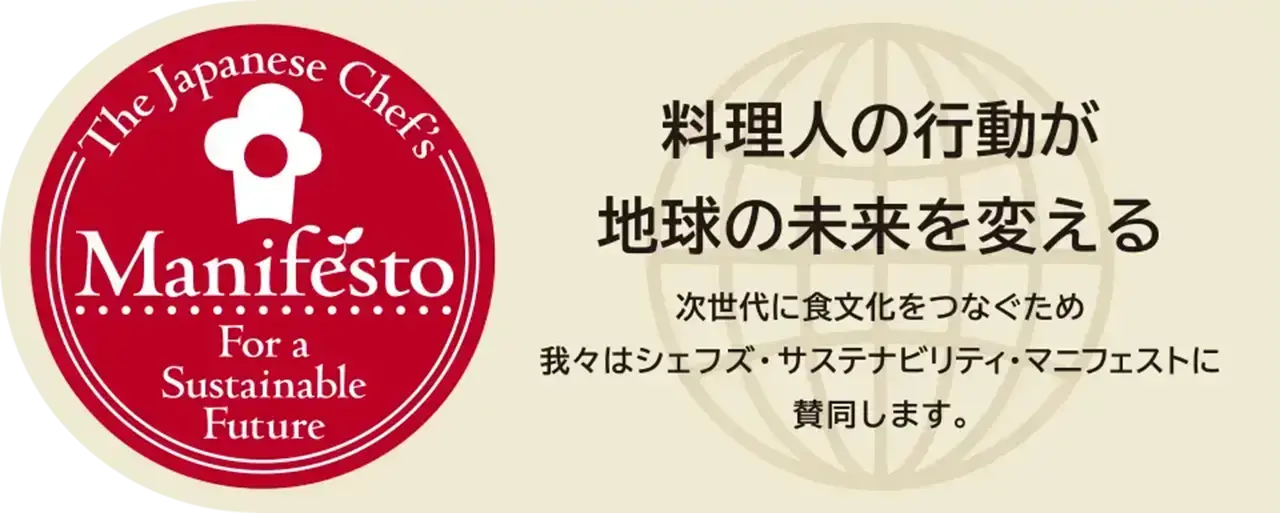The Japanese Chef’s Manifesto
for a Sustainable Future:
17 Guidelines Toward 2030


A Call to Action
Join Us in Shaping a Sustainable and Regenerative Future for Food in Japan and Beyond
The Sustainable Restaurant Working Team (SRWT) of the Council for Public-Private Partnership in Food Technology under the Ministry of Agriculture, Forestry and Fisheries of Japan (Chair: Mr. Takeshi Shimotaya, Executive Director of the Sustainable Restaurant Association Japan), has been working since 2023 to address a critical issue: In Japan, the number of consumers who choose restaurants based on sustainability remains low.
Recognizing this, SRWT has explored ways to make it easier for consumers to choose restaurants that prioritize sustainability. Through extensive dialogue and collaboration, we have compiled our findings into a comprehensive report and proposed a range of actionable strategies.
As part of this initiative, we have identified the need to engage those at the forefront of culinary innovation—chefs. We believe chefs play a vital role in leading the transition toward sustainable and regenerative food systems. To support this, we have created a guiding document titled:
“The Japanese Chef’s Manifesto for a Sustainable Future: 17 Guidelines Toward 2030.”
This manifesto offers clear direction and inspiration for chefs who are committed to building a better, more regenerative food future.
Why Chefs? Why Now?
Climate change, environmental degradation, biodiversity loss, and instability in global and local food systems are bringing us to an unprecedented turning point. In this era of transformation, the need for regenerative and sustainable food systems has never been greater.
In this context, chefs are far more than culinary professionals. They are:
- • Stewards of local food culture and tradition
- • Leaders in sustainable and regenerative food practices
- • Crucial connectors between producers and consumers
The Chef’s Sustainability Manifesto is a collective declaration of hope and commitment that serves as a roadmap for chefs to drive change through tangible, everyday actions. Each of the 17 principles was crafted through thoughtful discussion and represents a shared vision for 2030 and beyond. We believe that even small steps, when taken together, can create powerful waves of transformation.
Join Us From Within Japan and Around the World
To our international chefs living and working in Japan:
We warmly invite you to endorse this manifesto and join hands with fellow chefs in accelerating sustainable and regenerative action here in Japan. Your participation will be a powerful signal of unity and purpose.
To chefs and food professionals around the world:
We welcome your encouragement, your messages of support, and the stories of your own regenerative sustainability initiatives. By sharing our efforts and learning from one another, we can collectively create a global movement for a better food future.
Let us take this important step together.
Sustainability and regeneration are not merely choices; they represent meaningful investments in the future of our craft, our communities, and our planet.
Let us work together to shape a sustainable and regenerative future of food!
Passing Down Culinary Traditions and Embracing Food Diversity
Understand and express Japanese food culture and traditional cuisine.
Value the spirit of gratitude for the ingredients gifted by Japan’s abundant natural environment and respect nature itself. Express the diverse food cultures inherited across Japan, as well as the traditions, wisdom, ingenuity, and customs of Japanese cuisine, including fermented foods. Deeply understand that eating involves taking life, and express your gratitude through your cooking.
Explore the fusion of global traditional cuisines.
While preserving and respecting traditional regional Japanese cuisine, also pay equal respect to the traditional cuisines of the world. With sustainability as a core principle, seek the potential for a new culinary culture where different cuisines and cultures can coexist and harmonize.
Create conversations and smiles through meals, connecting people’s hearts.
Meals are not just for nutrition—they create special moments that bring people together, as well as a part of daily life. As chefs, one of our missions is to connect people’s hearts through meals and create precious moments shared with family and friends. Providing meals is not only about delivering delicious flavors; it also plays the role of generating conversation and smiles, and strengthening human bonds. Each dish should be prepared with heartfelt intention, creating a warm and comforting experience.
Sourcing
Support producers and use locally-sourced and seasonal ingredients.
Based on Japan’s traditional view of nature, which emphasizes coexistence and harmony with the the natural environment, we actively use local ingredients that reflect the climate, natural features, topography, and water systems of rural, mountainous, and coastal regions across Japan. This approach supports the transmission of regional food cultures, helps preserve local landscapes, and revitalizes communities. We also incorporate seasonal ingredients in tune with the rhythms of nature. In response to the aging population of producers and to maintain and improve Japan's food selfsufficiency rate, we support local farmers and promote initiatives for local production and consumption.
Use agricultural products cultivated in healthy soil.
We value harmony with nature and use agricultural products cultivated in environments where healthy soil and biodiversity are maintained—such as crops grown without pesticides or chemical fertilizers. By drawing out the natural flavors of ingredients nurtured by the environment, we aim to deliver dishes that awaken people’s true sense of taste and pursue authentic deliciousness.
Avoid endangered or declining fish species, and use traceable seafood.
We refrain from using endangered or declining fish species, as well as their juveniles or roe. In cooperation with fishers and those involved in the seafood industry, we use traceable seafood such as wild fish caught using low-impact fishing methods, farmed fish raised with eco-friendly feed in unpolluted environments, and certified sustainable fish. We exclude seafood from IUU (Illegal, Unreported, and Unregulated) fishing and promote the utilization of underused or unused fish species as a means of effective resource use.
Use animal products that consider animal welfare and the environment.
We prioritize animal welfare by choosing animal products from ethically raised livestock, such as freerange or pasture-raised animals. We offer meat sourced from livestock raised with environmentally and socially responsible feed. Furthermore, we utilize wild game such as boar and deer, which are captured as part of crop damage control based on Japanese situation, enhancing their value as local resources and contributing to the diversity of food culture.
Actively incorporate plant-based foods.
We increase the offering of plant-based foods and propose balanced, plant-forward menus centered on vegetables, fruits, legumes, and whole grains while respecting traditional food culture. We also designate certain days without meat or dairy products, reduce the use of animal-based ingredients, and provide protein alternatives such as legumes, nuts, and fermented foods without compromising nutritional value.
Respect the human rights of all involved in the food supply chain and conduct environmentally responsible sourcing.
We respect the human rights of all individuals involved in production, processing, and distribution across the domestic and international supply chain, and carry out sourcing with consideration for the natural environment. Ethical-certified products are prioritized, and we ensure fair pricing, appropriate working conditions, and the elimination of child and forced labor. We also systematically identify and address human rights and environmental risks in the supply chain and consider sustainable forest management and community support.
Reduce energy consumption and lower the carbon footprint.
In addition to using locally sourced and seasonal ingredients, we reduce resource consumption and environmental impact in the kitchen by selecting energy-efficient technologies and the latest cooking equipment with low environmental load. We calculate the carbon footprint of each location and aim to understand which ingredients have the greatest environmental impact, presenting this information in recipes. Furthermore, we actively pursue the use of renewable energy, implement energy-saving measures, and make environmentally conscious ingredient choices.
Reduce food loss and waste and use ingredients without waste.
Reducing food loss and waste is essential for improving food quality and achieving economic efficiency. We serve appropriate portion sizes, optimize ingredient usage, manage inventory rigorously, reduce transport-related food losses by using local ingredients, and promote practices such as take-out of leftovers and food donations. Food that must be discarded is not incinerated but instead recycled into sustainable resources such as animal feed, compost, or fuel.
Reduce resource use and eliminate waste through reuse and recycling.
We treat cans, bottles, PET bottles, paper, cardboard, and cartons as valuable resources and follow a priority order of: (1) Reduce, (2) Reuse, and (3) Recycle. We promote the reduction of single-use plastics and minimize waste by using reusable packaging and biodegradable materials. We also strive to use resources efficiently by promoting the reuse, upcycling, and recycling of used products, thereby contributing to the achievement of a circular economy.
Collaborate with producers to conserve biodiversity and restore the natural environment.
We promote the use of sustainably produced agricultural, marine, and livestock products, and actively communicate with primary industry producers. We actively seek collaborative opportunities to conserve biodiversity and take concrete actions that protect and restore natural ecosystems, thereby advancing a "nature-positive" future.
Create a workplace where everyone is fairly evaluated and can work with peace of mind.
We ensure that food service workers are fairly evaluated and appropriately treated by emphasizing performance reviews, skill development, and career building. We strive to provide fair compensation and benefits, improve working conditions, and respect diversity and inclusion. We also implement fair promotion systems and proper labor hour management while strengthening labor-management relations. Our goal is to create a workplace where everyone is respected and can work safely and comfortably, free from discrimination and prejudice.
Provide meals that consider both health and the global environment.
We provide safe and healthy meals by carefully selecting food additives (such as synthetic preservatives, artificial sweeteners, artificial colorings, artificial flavorings, antioxidants, curing agents, emulsifiers, and processing aids) based on scientific knowledge. We promote the use of sustainable, primarily plant-based ingredients with consideration for both health and environmental impact. For ingredients involving new biotechnologies, we clearly indicate relevant information on menus and similar materials to ensure transparency and empower consumers to make informed choices— contributing to the development of a healthier and more sustainable food culture.
Provide nutritionally balanced meals.
Nutritionally balanced meals support not only physical health but also emotional stability and mental well-being. We recognize that food plays a crucial role in maintaining both body and mind. We also offer fermented foods and other dishes that promote a healthy gut environment and provide high nutritional value.
Demonstrate leadership and form partnerships to raise awareness of sustainability.
We collaborate with primary sector workers (farmers and fishers), food companies, distributors, universities, and government agencies to promote the importance of sustainability. We also work with local communities to support sustainable initiatives and raise awareness throughout society. Through these efforts, we aim to minimize negative impacts on climate change and biodiversity and contribute to building a sustainable food system.
Footnotes
- Animal Welfare:
Refers to the physical and mental state of animals in relation to how they live and die. It emphasizes the importance of raising livestock in comfortable environments to reduce stress and disease, which in turn improves productivity and contributes to the production of safe livestock products. Animal welfare is based on ensuring the following "Five Freedoms":
① Freedom from hunger and thirst,
② Freedom from discomfort,
③ Freedom from pain, injury, or disease,
④ Freedom from fear and distress,
⑤ Freedom to express normal behavior. - Plant-Based Foods:
Diets that emphasize foods derived from plants and reduce or eliminate the consumption of animalbased products, encompassing a variety of eating practices. - Human Rights and Environmental Due Diligence:
A process by which businesses identify risks of human rights violations and negative environmental impacts in their operations and supply chains, and take steps such as prevention, monitoring, evaluation, reporting, and ensuring transparency to address them. - Carbon Footprint:
The total greenhouse gas (GHG) emissions, converted into CO₂ equivalents, generated throughout the entire life cycle of a product or service—from raw material procurement to disposal and recycling. This may be represented as a numerical value on the product or through a system that enables such labeling. - Circular Economy:
An economic approach that, in addition to the traditional 3Rs (Reduce, Reuse, Recycle), focuses on minimizing resource input and consumption while maximizing the value of resources and products. It aims to prevent waste generation through efficient stock utilization and value creation via servicebased models and other means. - Nature Positive:
An approach to put nature on the path to recovery by halting and reversing biodiversity loss. - Planetary Health / Planetary Health Diet:
Based on the idea that "humans and the planet are not separate entities but exist in mutual interdependence," planetary health refers to maintaining ecosystems where diverse life forms, including humans, coexist and thrive. The Planetary Health Diet is a dietary approach aimed at sustaining this balance by focusing on plant-based foods and reducing animal-based food consumption to ensure a sustainable way of eating. - New Biotechnology Foods:
Foods produced using genetic modification technologies, genome editing, and various breeding techniques, such as heavy-ion beam irradiation breeding.
References
- Ministry of Agriculture, Forestry and Fisheries (MAFF). (2023). About Animal Welfare.
Retrieved from: https://www.maff.go.jp/j/chikusan/sinko/animal_welfare.html (Accessed: January 31, 2025) - Farm Animal Welfare Council (FAWC). (1979). The Five Freedoms.
Retrieved from: https://webarchive.nationalarchives.gov.uk (Accessed: January 31, 2025) - World Health Organization (WHO). (2021). Plant-based diets and their impact on health, sustainability and the environment. WHO Regional Office for Europe.
https://apps.who.int/iris/handle/10665/349086 (Accessed: January 31, 2025) - Ministry of Economy, Trade and Industry (METI). (2022). Guidelines for Respecting Human Rights in Responsible Supply Chains, etc. METI.
Retrieved from: https://www.meti.go.jp/press/2022/09/20220913003/20220913003-a.pdf (Accessed: January 31, 2025) - Ministry of the Environment (MOE). (2020). Introduction to Environmental Due Diligence in the Value Chain. MOE.
Retrieved from: https://www.env.go.jp/content/900497033.pdf (Accessed: January 31, 2025) - Ministry of Economy, Trade and Industry & Ministry of the Environment. (2023). Carbon Footprint Guidelines.
Retrieved from: https://www.env.go.jp/content/000124385.pdf (Accessed: January 31, 2025) - Ministry of the Environment. (2023). White Paper on the Environment, Sound Material-Cycle Society, and Biodiversity – Section 2: Transition to a Circular Economy. MOE.
Retrieved from: https://www.env.go.jp/policy/hakusyo/r03/html/hj21010202.html (Accessed: January 31, 2025) - Ministry of the Environment. (2023). White Paper on the Environment, Sound Material-Cycle Society, and Biodiversity – Section 2: Nature Positive (Nature Restoration). MOE.
Retrieved from: https://www.env.go.jp/policy/hakusyo/r06/html/hj24010202.html (Accessed: January 31, 2025) - EAT-Lancet Commission. (2019). Healthy Diets from Sustainable Food Systems – Food, Planet, and Health.
Retrieved from: https://eatforum.org/content/uploads/2024/02/EATLancet_Commission_Summary_Report_Japanese.pdf (Accessed: January 31, 2025) - European Parliament Greens/EFA. (2021). Gene Editing Myths and Reality – A Guide Through the Smokescreen.
Original (English): https://extranet.greens-efa.eu/public/media/file/9065/6768 (Accessed: January 31, 2025)
Japanese translation: https://v3.okseed.jp/wpcontent/uploads/2024/07/okseed_GMguidebook_n3_220327_FIX.pdf (Accessed: January 31, 2025) - Ministry of Education, Ministry of Health, and Ministry of Agriculture, Forestry and Fisheries. (2016). Dietary Guidelines.
Retrieved from: https://www.maff.go.jp/j/syokuiku/shishinn.html (Accessed: January 31, 2025)
A Call to Action:
Let’s Create a Sustainable and Regenerative Future for Food in Japan and Beyond
We hope to share the love and commitment behind the Chefs‘ Sustainability Manifesto with more chefs and food professionals around the world. In particular, we sincerely invite international chefs and culinary professionals currently based in Japan to join us in raising their voices for this important cause. If you support the vision of this manifesto, please click the “Endorsement of the Chef’s Sustainability Manifesto” button at the bottom of this page and fill out the support form.
To expand this movement beyond Japan and into the global culinary community, we are also calling for messages of encouragement from chefs and food industry professionals living overseas. Your words of support will empower the promotion of food sustainability in Japan—and help spark a broader global momentum. In countries where a Chefs' Sustainability Manifesto does not yet exist, we also hope this initiative will inspire local chefs and food advocates to create their own manifestos rooted in their unique cultures and communities.
We aim to help spark a worldwide chain reaction of sustainable culinary action.
If you are a chef or food professional living outside Japan and would like to send a message of encouragement, please click the “Be Part of the Movement – Share Your Encouragement from overseas” button below and share your voice.
If this manifesto resonates with you, we encourage you to share it on social media and showcase your own examples of sustainable practices.
Together, through our own actions, let’s cultivate a rich food culture where deliciousness and sustainability go hand in hand.
We invite international chefs working in Japan to endorse the Chefs' Sustainability Manifesto.
Click the button below to share your endorsement.
Benefits of Supporting the Chefs' Sustainability Manifesto
By expressing your support, you will receive the following benefits.
- Introduction on the List of SupportersYour restaurant or company name will be featured on our website.
- Sharing of the Latest InformationWe will provide updates on the latest sustainability initiatives and campaign news.
- Exchange of Knowledge and Know-HowWe will share information and case studies related to sustainable practices.
- Networking OpportunitiesYou’ll have chances to participate in events and workshops, and connect with like-minded peers.
-
 Use of Supporter BannerWe will provide you with a banner showing your support, which you can display on your website or in your store.
Use of Supporter BannerWe will provide you with a banner showing your support, which you can display on your website or in your store.

